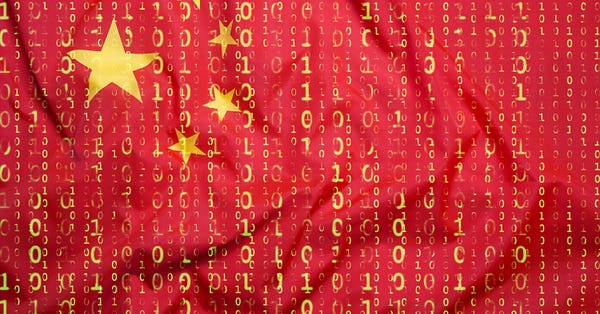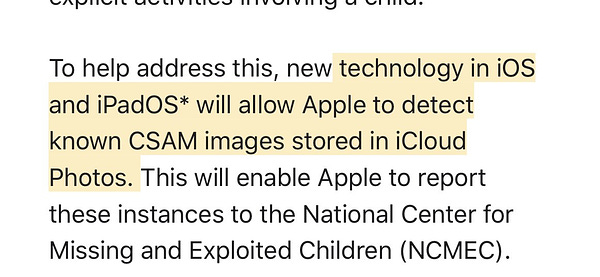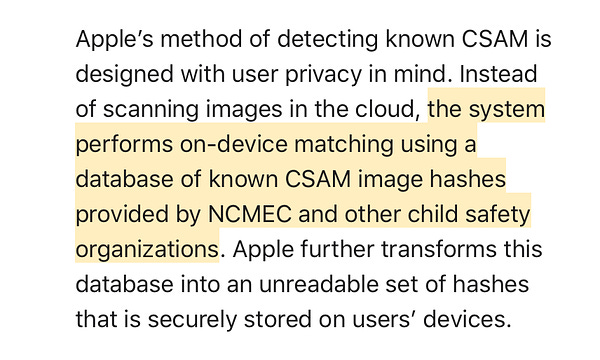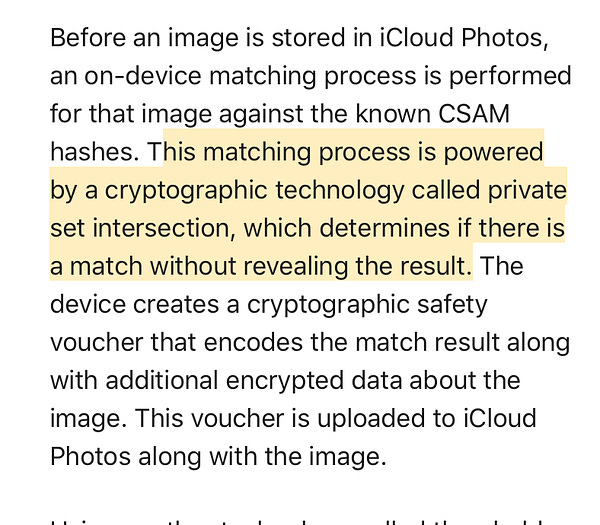DiDi considers giving up control of data to appease Beijing | Australian 2021 Census likely to be targeted by cyber criminals | Apple to scan for child abuse through software on US iPones
Follow us on Twitter. The Daily Cyber Digest focuses on the topics we work on, including cyber, critical technologies & strategic issues like foreign interference.
Didi Global Inc. is weighing giving up control of its most valuable data as part of efforts to resolve a Chinese regulatory probe into the aftermath of its controversial U.S. initial public offering, people familiar with the matter said. Bloomberg
Cyber adversaries around the world will be targeting this year’s census, which is certain to come under attack again, cyber security experts say. It’s just a matter of how well the lessons of 2016 have been learnt and whether measures taken by the ABS to protect against a repeat performance will prove to be effective. Government News
Apple intends to install software on American iPhones to scan for child abuse imagery, according to people briefed on its plans, raising alarm among security researchers who warn that it could open the door to surveillance of millions of people’s personal devices. Financial Times
ASPI ICPC
Experts warn 2021 census will be a magnet for cyber criminals
Government News
@judy_skatssoon
Cyber adversaries around the world will be targeting this year’s census, which is certain to come under attack again, cyber security experts say. It’s just a matter of how well the lessons of 2016 have been learnt and whether measures taken by the ABS to protect against a repeat performance will prove to be effective. Senior analyst with the Australian Strategic Policy Institute and author of an ASPI guide on building government services for peak demand, Tom Uren, says he’d be surprised if the census wasn’t targeted.
The 9pm Anti-Lockdown Freedom Nazis with Ariel Bogle
STILGHERRIAN
@arielbogle
We talk about many things, including Dan Andrew’s supposedly fake back injury, COVID-19 disinformation, cold showers, far-right political video activists, imaginary bullfighting, content moderation, YouTube banning Sky News Australia, and of course the cybers and the lack of reporting thereof.
World
How emerging technologies could shape the 2032 Olympics
TheNextWeb
Andrea Hak
After being postponed a year due to the pandemic, the 2021 Tokyo Olympics are cause for great excitement. We’ve waited impatiently to once again, behold the impressive display of sporting skills and competitive endeavors from the top athletes in the world. But an additional factor to get excited about this year is the introduction of many new technologies used to enhance the whole experience.
Australia
‘Not intended or contemplated’: Turnbull says foreign influence laws need review
The Sydney Morning Herald
@Gallo_Ways
Former prime minister Malcolm Turnbull says the nation’s foreign influence laws need to be reviewed amid growing criticism of the regime for targeting former politicians speaking at public events. Mr Turnbull, who introduced the laws in 2017, said he did not intend for the Foreign Influence Transparency Scheme to be used as widely as it has been after he registered himself for speaking at a South Korean-backed forum that was broadcast to the public.
Morrison appoints former BlackRock boss to help fix China relationship
The Australian Financial Review
@MikeSmithAFR
The Morrison government has appointed a former top Asia executive for the world’s largest asset manager, BlackRock, to head its $44 million China foundation, which Canberra hopes will help reboot relations with Beijing.
Proposed AFP dark web powers get cautious tick
The Sydney Morning Herald
@Gallo_Ways
Politicians want the authority to oversee proposed new police powers to take over the online accounts of criminals and terrorists, as well as tougher hurdles for warrants and an independent review within three years. The Australian Federal Police and the Australian Criminal Intelligence Commission would be given powers to hunt paedophile rings, terrorists and drug traffickers operating on the “dark web” under planned laws.
Australian Court Ridiculously Says That AI Can Be An Inventor, Get Patents
Tech Dirt
@mmasnick
There have been some questions raised about whether or not AI-created works deserve intellectual property protection. Indeed, while we (along with many others) laughed along at the trial about the monkey selfie, we had noted all along, that the law firm pushing to give the monkey (and with it, PETA) the copyright on the photo was almost certainly trying to tee up a useful case to argue that AI can get copyright and patents as well. Thankfully, the courts (and later the US Copyright Office) determined that copyrights require a human author.
Aust presses US for regional digital trade pact
Innovation Aus
@denhamsadler
Australia is in active discussions with the US to sign a regional digital trade agreement in an effort to re-engage America in the Indo-Pacific region and boost the local technology sector. Trade Minister Dan Tehan has just returned from a trip to the United States, Japan, South Korea, Singapore and Vietnam, where the prospects of a digital trade agreement was a central theme. Such an agreement would be modelled on Australia’s digital economy agreement with Singapore, which came into effect late last year, and would cover issues like standardised digital payment rules, data localisation and data privacy with an aim of breaking down barriers to digital trade.
China
Didi Weighs Giving Up Data Control to Appease Beijing
Bloomberg
Didi Global Inc. is weighing giving up control of its most valuable data as part of efforts to resolve a Chinese regulatory probe into the aftermath of its controversial U.S. initial public offering, people familiar with the matter said.
Didi in talks with state-backed Westone to hand over data control-sources
Reuters
@julie_zhuli
Chinese ride-hailing firm Didi Global Inc is in talks with state-owned information security firm Westone to handle its data management and monitoring activities, sources said, as part of its efforts to placate domestic regulators.
China’s Growing Censorship Is Training the Public to Be Online Snitches
Foreign Policy
@Tracy_Wen_Liu
In March, when the United Kingdom, the European Union, Canada, and the United States announced sanctions on Chinese officials over China’s treatment of Uyghurs in Xinjiang, Chinese netizens called for a boycott of H&M, Nike, Adidas, Burberry, and a few other western fashion brands. In April, an old acquaintance of mine, an engineer living in Jiangsu province, posted on his WeChat Moment—a public-facing part of the ubiquitous social media platform and messaging service—expressing his frustration that people kept purchasing items from these brands. He received support from a few others with a similar mindset, and they later on formed a WeChat group, designed a few leaflets arguing for boycotts, and planned to distribute these leaflets in front of a major department store on Labor Day.
WeChat’s youth mode is illegal, says lawsuit, as China steps up attack on Tencent
The Guardian
Prosecutors in Beijing have initiated a civil lawsuit against a subsidiary of Tencent, saying the “youth mode” on the company’s popular social messaging app WeChat does not comply with laws protecting minors. The lawsuit was initiated on Friday by Beijing’s Haidian district people’s procuratorate against Shenzhen Tencent Computer Systems, according to a filing posted on JCRB.com, a website run by China’s top prosecutor, Reuters reported.
From Ant to Didi and private education firms, China stock rout is a mess of its own making
The South China Morning Post
@wangxiangweihk
It seemed not long ago that China’s stock markets in Shanghai and Shenzhen were very much out of step with the global markets, mostly governed by the top-down approach of heavy-handed government intervention. But circumstances have changed greatly since China’s economy became the second largest in the world, and Beijing promised to allow the market to play a “decisive” role in the economy. Now the central government’s political or economic decisions often carry global implications.
Duolingo app no longer available on some Chinese app stores
Reuters
@aakriti_bhalla @brendagoh_ @DavidKirton_
Duolingo Inc said late on Thursday it was aware that its popular Duolingo language learning app was no longer available for download on some app stores in China. Its removal from the Chinese app stores comes after Beijing last month issued rules barring curriculum-based tutoring for profit and barred foreign investment in the sector, dealing a blow to the country's $120 billion private tutoring industry.
Xi Jinping’s Tech Crackdown Ignores Bigger Problems Facing China
Bloomberg
@abrownepek
The China Federation of Literary and Art Circles doesn’t usually weigh in on matters that affect the Chinese economy. It operates in the sphere of ideology, ensuring that cultural output toes the Communist Party line. For that reason, it sponsors the Golden Rooster movie awards, China’s answer to the Golden Globes.
Huawei posts largest-ever revenue drop amid US crackdown
Nikkei Asia
@ChengTingFang @Lauly_Th_Li
Huawei Technologies on Friday reported its biggest-ever decline in revenue, with its first half figure plunging more than 29% on the year due to a U.S. clampdown on the company's access to key chip supplies. The Chinese tech champion said revenue for the first half reached 320.4 billion yuan ($49.56 billion). The company's net profit margin, however, improved to 9.8% from 9.2% in the same period last year.
Alibaba Warns of Higher Taxes as China Crackdown Widens
Bloomberg
@pingroma
Alibaba Group Holding Ltd. has warned investors that years-long government tax breaks for the internet industry will start to dwindle, adding billions of dollars in costs for China’s largest corporations as Beijing extends its campaign to rein in the sector.
China’s ByteDance aims for Hong Kong IPO despite tech crackdown
The Financial Times
@mjruehl @Tabby_Kinder @mileskruppa
ByteDance, the owner of short-video app TikTok, has revived a plan to go public despite a widening regulatory assault targeting Chinese technology companies, aiming for a Hong Kong listing by early next year. The Chinese group, which raised about $5bn in December at a $180bn valuation, is planning to list in either the fourth quarter of this year or early 2022, said three people with knowledge of the company’s plans.
China chip school teaches ways of Huawei and talent-hungry peers
Nikkei Asia
@CKTan80
The Chinese government is on a mission to make up a shortfall of hundreds of thousands of semiconductor engineers, as the country works up a voracious appetite for chips and spars with the U.S. Globally, the tech industry faces a shortage of the microchips that power everything from smartphones to earphones to car sensors. It also lacks enough skilled talent to produce them, especially in China, which consumes about a quarter of the world's output.
Machine learning generates insights into worldwide terrorist attacks
TheNextWeb
@thomas_macaulay
A team of researchers has used machine learning to predict and explain terrorist attacks. Their tests suggest the models can accurately predict attacks in regions that are already affected by terrorism. However, they found that “black swan events,” which occur sporadically, are almost impossible to predict. The researchers, led by Dr Andre Python from Zhejiang University in China, used publicly available data to analyze the location and data of attacks that occurred between 2002 and 2016 in 13 regions of the world.
A Chinese CCTV firm angrily denied being complicit in repressing Uyghur Muslims after MPs pushed for it to be banned in the UK
Business Insider
@direthoughts.
Hikvision, a Chinese camera manufacturer implicated in human-rights abuses against the Uyghur minority in China, has said a British Parliamentary committee's call for a UK ban on the company is a "knee-jerk reaction". The Foreign Affairs Committee published a report on July 8 calling on the UK government to ban Hikvision equipment from the UK. It further asked the government to prohibit UK firms from conducting business with Hikvision and "any companies known to be associated with the Xinjiang atrocities through the sanctions regime".
USA
Apple plans to scan US iPhones for child abuse imagery
Financial Times
@madhumita29 @tim
Apple intends to install software on American iPhones to scan for child abuse imagery, according to people briefed on its plans, raising alarm among security researchers who warn that it could open the door to surveillance of millions of people’s personal devices. Apple detailed its proposed system — known as “neuralMatch” — to some US academics earlier this week, according to two security researchers briefed on the virtual meeting.
Apple reveals new efforts to fight child abuse imagery
The Verge
@russellbrandom @rjcc
In a briefing on Thursday afternoon, Apple confirmed previously reported plans to deploy new technology within iOS, macOS, watchOS, and iMessage that will detect potential child abuse imagery, but clarified crucial details from the ongoing project. For devices in the US, new versions of iOS and iPadOS rolling out this fall have “new applications of cryptography to help limit the spread of CSAM [child sexual abuse material] online, while designing for user privacy.”
Why experts are worried about Apple’s plan to scan every picture on your iPhone
TheNextWeb
@IndianIdle
Last night, Apple made a huge announcement that it’ll be scanning iPhones in the US for Child Sexual Abuse Material (CSAM). As a part of this initiative, the company is partnering with the government and making changes to iCloud, iMessage, Siri, and Search. However, security experts are worried about surveillance and the risks of data leaks. Before taking a look at those concerns, let’s understand, what is Apple doing exactly?
WhatsApp lead and other tech experts fire back at Apple’s Child Safety plan
The Verge
@strawberrywell
The chorus of voices expressing concern and dismay over Apple’s new Child Safety measures grew louder over the weekend, as an open letter with more than 4,000 signatures made the rounds online. The Apple Privacy Letter asked the iPhone maker to “reconsider its technology rollout,” lest it undo “decades of work by technologists, academics and policy advocates” on privacy-preserving measures.
Apple's Plan to "Think Different" About Encryption Opens a Backdoor to Your Private Life
Electronic Frontier Foundation
@imck82 @ohemorange
Apple has announced impending changes to its operating systems that include new “protections for children” features in iCloud and iMessage. If you’ve spent any time following the Crypto Wars, you know what this means: Apple is planning to build a backdoor into its data storage system and its messaging system.
The FTC hits back at Facebook after it shut down NYU research
protocol
@issielapowsky
In a letter to Mark Zuckerberg Thursday, the Federal Trade Commission's acting director for the Bureau of Consumer Protection said Facebook should not "use privacy" as "a pretext to advance other aims," after Facebook shut down the accounts of a team of researchers who were studying political ads on the platform. Facebook said the researchers had violated the company's terms of service which prohibit scraping.
Facebook’s attempt to ban academics runs into trouble
POLITICO
@markscott82
A digital tool at the center of a battle between Facebook and researchers over efforts to boost awareness of how people are targeted with political ads is still working despite efforts by the social networking giant to shut it down. Laura Edelson, who leads the cybersecurity and democracy project at New York University and whose Facebook account was suspended Monday as part of the crackdown, told POLITICO that her team's web browser plug-in, which allows roughly 16,000 people to share with researchers the types of political paid-for messages that are redisplayed in their Facebook news feeds, is operational and collecting data.
Ransomware Attack Forces Indiana Hospital to Turn Ambulances Away
The Daily Beast
@shanvav
Hackers are going after U.S. hospitals with a fresh wave of cyberattacks this week just as coronavirus cases surge around the country. Eskenazi Health, a health-care service provider that operates a 315-bed hospital, inpatient facilities, and community health centers throughout Indianapolis, was crippled by a ransomware attack that began between 3:30 and 4 a.m. Wednesday morning, a spokesperson told The Daily Beast.
As senators zero in on deepfakes, some experts fear their focus is misplaced
The Washington Post
@viaCristiano
A bipartisan group of lawmakers is moving ahead with legislation to combat deepfakes by launching a new federal task force — but experts question whether politicians and the public have been too focused on the nascent tech and not enough on cruder types of misleading content that constitutes a more immediate threat. On Wednesday, a Senate panel unanimously advanced legislation to create a task force in the Department of Homeland Security charged with countering deepfakes — images manipulated through artificial intelligence used to fabricate events, such as faking that a politician or public figure said something they didn’t.
Drunk-driving provision could fuel demand for driver monitoring technology
Tech Crunch
@rebeccabellan
Companies developing driver detection technology could get a boost from a provision tucked inside the 2,702-page $1 trillion infrastructure bill that would require automakers to build into new cars technology that can tell if drivers have had a few cold ones. The provision in the bill, which is actually a piece of bipartisan legislation called the Reduce Impaired Driving for Everyone Act that was introduced in April 2021, would direct the U.S. Department of Transportation to establish a technology safety standard for automakers within three years.
Behind the Rise of U.S. Solar Power, a Mountain of Chinese Coal
The Wall Street Journal
@DJMatthewDalton
Solar panel installations are surging in the U.S. and Europe as Western countries seek to cut their reliance on fossil fuels. But the West faces a conundrum as it installs panels on small rooftops and in sprawling desert arrays: Most of them are produced with energy from carbon-dioxide-belching, coal-burning plants in China.
Intel agencies scour reams of genetic data from Wuhan lab in Covid origins hunt
CNN
@KatieBoWillCNN @ZcohenCNN @NatashaBertrand
US intelligence agencies are digging through a treasure trove of genetic data that could be key to uncovering the origins of the coronavirus -- as soon as they can decipher it. This giant catalog of information contains genetic blueprints drawn from virus samples studied at the lab in Wuhan, China which some officials believe may have been the source of the Covid-19 outbreak, multiple people familiar with the matter tell CNN.
Pacific Islands
Australian P.M. eats during Pacific leaders' summit, draws scorn
Samoa Observer
@TMataafaTufele
Social media users have chastised Australian Prime Minister Scott Morrison for eating while in an historic digital meeting of the 50th anniversary of the Pacific Islands Forum on Friday in an act widely viewed as disrespectful.
South Asia
Amazon Wins Court Battle in India Against a Local Powerhouse
The New York Times
@Karan_Singhs @emilyschmall
India’s Supreme Court on Friday ruled in favor of Amazon’s bid to block a multibillion-dollar deal that would give the country’s richest man control over an Indian supermarket chain, in a boost to the American retailing giant’s ambitions toward India’s nearly $900 billion retail market.
UK
Amazon's Massive GDPR Fine Shows the Law's Power—and Limits
WIRED
@mattburgess1
We were promised huge fines, and GDPR has finally delivered. Last week Amazon’s financial records revealed that officials in Luxembourg are fining the retailer €746 million ($883 million) for breaching the European regulation.
Britain says China's BGI must register prenatal tests by Sept 1
Reuters
@asmo17 @KirstyLNeedham
China's largest gene company BGI Group must register its prenatal test with local regulators by Sept. 1 if it wants to keep offering products in Britain, a minister said on Thursday. A Reuters report found BGI Group developed the tests in collaboration with China's military and uses them to collect genetic data from millions of women round the world.
Europe
EU officials investigating breach of Cybersecurity Atlas project
The Record
@campuscodi
The European Commission is investigating a breach of its Cybersecurity Atlas project after a copy of the site’s backend database was put up for sale on an underground cybercrime forum on Monday. Launched in 2018, the Cybersecurity Atlas is a Yellow-Pages-like contact list of European organizations with cybersecurity expertise. On Monday, a threat actor posted a thread on an underground cybercrime forum claiming to have obtained access to the entire Cybersecurity Atlas database, which they were willing to sell via Discord.
How EU edtech startups are navigating the pandemic
VentureBeat
@JillPetz
The edtech sector was ripe for a revolution long before the global pandemic forced parents to become teachers and schools to go virtual. This accelerated switch to online learning also prompted investors to fling money at edtech startups, with the expectation that the education sector will be permanently changed.
Step 1: Do a Google search. Ransomware hacker goes rogue, leaks gang's plan.
NBC News
@kevincollier
Someone claiming to work with one of the most notorious ransomware gangs says they’re fed up with how extortion money is divvied up and has leaked a host of the gang's files on a hacker forum. The files, posted to a forum frequented by Russian-speaking cybercriminals and reviewed by NBC News, include numerous instruction manuals allegedly belonging to Conti, a Russian-speaking hacker group that has attacked several hospitals, including health care chains in the U.S., and Ireland’s national system, the Health Service Executive.
Russia
Russian Disinformation Targets Vaccines and the Biden Administration
The New York Times
@julianbarnes
The cartoon posted on the far-right discussion forum showed police officers wearing Biden-Harris campaign logos on bulletproof vests and battering down a door with a large syringe. A caption read in part, “In Biden’s America.” The cartoon appears to be an example of the latest effort in Russian-aligned disinformation: a campaign that taps into skepticism and fears of coronavirus vaccination to not just undermine the effort to immunize people but also try to falsely link the Biden-Harris administration to the idea of forced inoculations.
A new kind of ‘foreign agent’ Russian journalists risk a dreaded designation for reporting on army hazing, space-agency corruption, and much more. Felony liability looms, as well.
Meduza
Denis Dmitriev
In July, the Federal Security Service (FSB) published a draft order outlining what kinds of information could be used to “threaten the security of the Russian Federation.” This document is also meant to explain in which circumstances Russian citizens and foreign nationals are expected to self-report to the Justice Ministry and register as “foreign agents.” Failure to comply with these rules risks felony charges. Meduza breaks down what’s required here and what’s at stake for potential “foreign agents.”
Americas
Canada’s cyber security chief shifts focus to developing COVID-19 vaccine passport
Global News
@amandacconn @dvdlao
One of the country’s leading voices on cyber security is shifting focus to take on a new role developing the COVID-19 vaccine passport that Canadians will be able to use for travelling abroad. Scott Jones, who has been a familiar voice weighing in on the risks of recent high-profile hacks and ransomware attacks, is leaving the Canadian Cyber Security Centre to become the new federal lead on proof of vaccine credentials with Immigration, Refugees and Citizenship Canada.
Big Tech call center workers face pressure to accept home surveillance
NBC News
@oliviasolon
Colombia-based call center workers who provide outsourced customer service to some of the nation’s largest companies are being pressured to sign a contract that lets their employer install cameras in their homes to monitor work performance, an NBC News investigation has found.
Misc
Scammer Service Will Ban Anyone From Instagram for $60
VICE
@josephfcox
Scammers are abusing Instagram's protections against suicide, self-harm, and impersonation to purposefully target and ban Instagram accounts at will, with some people even advertising professionalized ban-as-a-service offerings so anyone can harass or censor others, according to screenshots, interviews, and other material reviewed by Motherboard.


Facebook reportedly wants to securely mine your encrypted data to target ads
TheNextWeb
@IndianIdle
There’s no secret that Facebook loves ads. It has stuffed the blue app and different features of Instagram with them. And the company has contemplated many times inserting ads in WhatsApp. Now the company is trying to make a match of an odd pair: encryption and ads. According to a report from The Information, the tech giant is building a team of AI researchers to explore possibilities to analyze data without breaking encryption.
How the Far-Right Weaponised Memes
VICE
@tim_hume @Henry_Langston @tjbenno
The far-right has always appreciated the value of propaganda – and had a knack for it. But after the resounding defeat of fascism – and the discrediting of its ideology – in World War II, traditional far-right propaganda just didn’t hit the same. A new mode of political messaging was required that could somehow get around the general public’s aversion to overtly racist, bigoted politics. With the rise of social media, that new tool had arrived. Enter the meme: a powerful new mode of pop cultural language that has helped give far-right ideas and values renewed global reach and influence over the past decade.
TikTok beauty filters can be super realistic—unless you're a person of color
Mashable
@jennnimai
When I first came across the Glow Look filter on TikTok, I dragged my self-absorbed ass into the video maker to try it on. I was expecting to be wowed by my own hotness, just like all the other girls on my For You Page. Instead, I tapped the filter on, and immediately guffawed. It looked ridiculous, to say the least. The enlarged, bright blue eyes, flushed cheeks, and noticeably thinner nose looked extremely out of place on my Vietnamese face.
Can you recycle a hard drive? Google is quietly trying to find out
Grist
@themadstone
At a laboratory inside a Google data center in Mayes County, Oklahoma, researchers spent the fall of 2019 disassembling old hard disk drives by hand in order to extract a 2-inch-long component known as the magnet assembly. Consisting of two powerful rare earth magnets, the magnet assembly is a critical muscle within the hard drive, controlling an actuator arm that allows the device to read and write data.
Is the Cookie Web Tracker Dying?
The Markup
@write_this_way
Cookies may be one of the most maligned parts of the internet, but they weren’t always so notorious. Back in 1994, a young man named Lou Montulli developed the cookie as a way for website operators to help users save work by remembering them across multiple visits.
What is decentralized finance? An expert on bitcoins and blockchains explains the risks and rewards of DeFi
The Conversation
@kwerb
Fervent proponents of cryptocurrencies and the blockchains they run on have promised a lot. To them, these technologies represent salvation from corporate power over the internet, government intrusions on liberty, poverty and virtually everything else that ails society. But so far, the reality has mostly involved financial speculation with popular cryptocurrencies like bitcoin and dogecoin, which soar and plunge with alarming regularity.
Research
China is Fast Outpacing U.S. STEM PhD Growth
Center for Security and Emerging Technology
@CSETGeorgetown
Since the mid-2000s, China has consistently graduated more STEM PhDs than the United States, a key indicator of a country’s future competitiveness in STEM fields. This paper explores the data on STEM PhD graduation rates and projects their growth over the next five years, during which the gap between China and the United States is expected to increase significantly.
POMEPS Studies 43: Digital Activism and Authoritarian Adaptation in the Middle East
The Project on Middle East Political Science
The Project on Middle East Political Science partnered with Stanford University’s Center for Democracy, Development and the Rule of Law and its Global Digital Policy Incubator for an innovative two week online seminar to explore the issues surrounding digital activism and authoritarianism. POMEPS STUDIES 43 collects essays from that workshop, shaped by two weeks of public and private discussion.





Events & Podcasts


Jobs
ICPC Deputy Director – 12 month parental leave cover
ASPI ICPC
ASPI’s International Cyber Policy Centre (ICPC) is currently recruiting for a one-year parental leave cover for its Deputy Director position. This is an exceptional opportunity for a talented and experienced individual to contribute to the work of Australia's leading think-tank on cyber, information, technology and other national security issues in a unique leadership role.
ICPC Senior Analyst & Program Manager
ASPI ICPC
ASPI’s International Cyber Policy Centre (ICPC) potentially has an outstanding opportunity for a proactive, efficient and talented senior analyst & program manager to join its centre..We are looking for a senior individual with a minimum of 10-15 years of demonstrated relevant work experience who possesses excellent project management, stakeholder engagement and staff management skills. They must also possess strong knowledge - either as a generalist or a specialist - of some of the topics ICPC works across, and feel comfortable engaging with politicians, senior policymakers, business representatives and preferably also the media.
ICPC Senior Analyst or Analyst - China
ASPI ICPC
ASPI’s International Cyber Policy Centre (ICPC) has a unique opportunity for exceptional and experienced China-focused senior analysts or analysts to join its centre. This role will focus on original research and analysis centred around the (growing) range of topics which our ICPC China team work on. Our China team produces some of the most impactful and well-read policy-relevant research in the world, with our experts often being called upon by politicians, governments, corporates and civil society actors to provide briefings and advice. Analysts usually have at least 5 years, often 7-10 years’ of work experience. Senior analysts usually have a minimum of 15 years relevant work experience and, in addition to research, they take on a leadership role in the centre and tend to be involved in staff and project management, fundraising and stakeholder engagement.
















